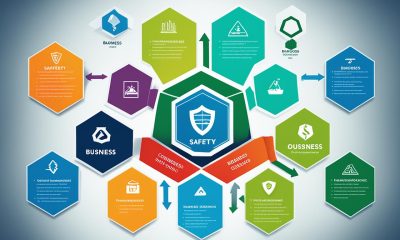Empowering Your Future with Financial Education
This article shows you how crucial financial education is. In today’s world, understanding money matters is key to reaching your goals. It helps whether you want to increase your wealth, invest wisely, or have a secure retirement.
Financial education gives you the tools to manage money effectively. It helps you take charge of your future. You’ll make choices that fit your goals and what’s important to you.
Learning about finances opens doors to more wealth. Knowing about investing and how to grow your money can help you build a solid financial future.
Being smart about investing is crucial, and financial education is vital here. With good knowledge, you can pick the best investments, lower risks, and grow your money over time. Financial education guides you through investing complexities, enhancing your chances of success.
Planning for retirement is vital, and so is financial education. It involves knowing your retirement options and what you’ll need money-wise. Financial education can guide your retirement planning, ensuring a worry-free future.
Key Takeaways:
- Financial education is essential for achieving your financial goals.
- It empowers you to grow your wealth, make smart investment decisions, and plan for a secure retirement.
- By investing in your financial education, you can take control of your financial future.
- Financial education opens doors to opportunities for wealth creation and maximizes your investment potential.
- Integrating financial education into your retirement planning process ensures a secure and comfortable future.
Understanding the Basics of Financial Education
Financial literacy is key to handling personal finance and managing money well. Learning about this area helps people make smart choices with their money. They can set goals, budget, and handle money smarter. This section gives a detailed look at basic financial education ideas.
Financial Literacy
Financial literacy means knowing and using key money concepts. It’s about having the skills to manage personal money matters well. Getting better at financial literacy lets people deal with money issues and make choices that match their aims and beliefs.
Personal Finance
Personal finance deals with managing your money, including what you earn, spend, save, and invest. It’s about making a budget, keeping track of spending, saving for emergencies and goals, and choosing financial products smartly.
Budgeting Tips
Creating and following a budget is a must for learning financial education. Budgeting means setting aside money for different needs like rent, travel, food, and fun. With a budget and monitoring spending, people can control their money, avoid wasting it, and save for later.
Budgeting Tips:
- Track your expenses: Keep a record of all your expenditures to identify areas where you can cut back and save.
- Set financial goals: Establish short-term and long-term goals to guide your budgeting efforts.
- Create a realistic budget: Ensure that your budget aligns with your income and financial obligations.
- Review and adjust regularly: Regularly review your budget and make adjustments as needed to reflect changes in your income and expenses.
Money Management Strategies
Good money management means using your financial resources wisely. This involves saving and investing smartly, handling debt, and protecting your finances. By using wise money management techniques, people can grow their wealth, avoid debt, and meet their financial targets.
“Financial education is not just about understanding numbers; it’s about having the knowledge and confidence to make sound financial decisions that can improve your financial well-being.”
Learning financial education basics is the first step towards financial freedom and success. By getting better at financial literacy, handling personal finance, using budgeting tips, and following smart money management methods, individuals can take charge of their financial future. This builds a strong base for lasting financial health.
Building Wealth through Financial Education
Financial education is crucial in building wealth. It gives people the knowledge and skills they need. This helps them make smart decisions and manage their money well over time.
Knowing how to invest is a big part of growing your wealth. Financial education teaches about stocks, bonds, real estate, and mutual funds. People learn to understand risks, study market trends, and choose investments wisely to increase their wealth.
But it’s not all about investing. You also need to know how to manage your money. Financial education shows how to budget, deal with debt, and spend smartly. It gives you control over your finances and helps you use your money better.
“Financial education is not just about numbers and calculations; it’s about developing the right mindset and adopting healthy financial habits.”
It’s important to know about compound interest, diversification, and tax planning. These ideas help grow and protect your wealth. Financial education covers these topics well.
Financial education encourages a hands-on approach to money management. It helps people adjust to market changes and make smart financial choices. This leads to success in managing money long-term.
To show what we mean, let’s look at a table. It shows the returns from different investments over 10 years:
| Investment Strategy | Average Annual Return |
|---|---|
| Stock Market | 8% |
| Real Estate | 6% |
| Mutual Funds | 7% |
| Bond Market | 3% |
This table shows how various investments perform differently. With financial education, people can choose the best places for their money. This helps them build wealth more effectively.
In conclusion, financial education is key to building wealth. Learning about investments and money management sets the stage for success. It opens up growth opportunities, improves decisions, and helps people grow and keep their wealth.
Maximizing Your Returns with Smart Investing
Smart investing is crucial for reaching your financial goals. It involves learning about different strategies. This knowledge lets you make wise decisions that match your financial plans.
Investment Strategies
Many strategies exist for investors with different risk tolerances and objectives. Some key strategies are:
- Growth Investing: This focuses on companies expected to grow significantly. These companies might be in new industries or have fresh products/services.
- Value Investing: This strategy finds stocks or assets that are priced below their true value. These investments are believed to grow in value over time.
- Income Investing: Aimed at generating steady income, this approach involves dividend-paying stocks, bonds, or REITs. It’s for those wanting regular cash flow.
- Index Investing: This strategy tracks a market index like the S&P 500, offering diversification and usually lower fees.
Understanding these strategies helps determine the best fit for your goals and risk level. Diversifying your investments is also key to managing risk and increasing potential gains over time.
Techniques for Maximizing Returns
To boost your returns, consider these techniques:
- Asset Allocation: Spread your investments across different classes, like stocks and real estate. This strategy reduces risk and can enhance returns. The right allocation varies by individual goals and risk tolerance.
- Regular Rebalancing: Ensure your investments stay aligned with your goals by rebalancing. This can involve buying more of undervalued assets.
- Investment Research: Before investing, thoroughly research your options. This includes keeping up with market trends and analyzing company finances. Good research can lead to better investment choices.
- Long-Term Perspective: Focus on the long term to overcome market volatility. This perspective can take advantage of compounding growth over time.
Smart investing means always learning and adjusting as markets change. By enhancing your financial education, you’ll be better equipped to make informed decisions and maximize your investment returns.
Secure Your Future with Effective Retirement Planning
Retirement planning is crucial for a secure future. It’s smart to start early. With the right knowledge and tools, you can enjoy a stable and comfortable retirement.
It’s not just about saving money. Planning for retirement means thinking about your lifestyle, healthcare, inflation, and more. Learning about finances is key.
Learning about finances helps you make smart choices. You’ll understand how to build wealth and reach your retirement goals. It’s about knowing the steps to take for a secure future.
Benefits of Integrating Financial Education into Retirement Planning
“Retirement planning is not just about numbers; it’s about making smart choices that align with your long-term financial well-being.”
Integrating financial education into retirement planning has many benefits:
- Wealth Building: Learning about investments and asset allocation helps you grow your wealth and secure your financial future.
- Risk Mitigation: Understanding market risks and unexpected costs lets you plan better and reduce potential losses.
- Confidence in Decision Making: Knowing the basics of retirement planning boosts your confidence. You can make choices that fit your life and goals.
- Flexibility and Adaptability: Financial knowledge lets you adapt to economic changes. You can adjust your plan to make the most of new opportunities.
- Peace of Mind: Being well-informed gives you confidence and peace. It means knowing you’re prepared for retirement, bringing you peace and assurance.
Retirement may seem far away, but it’s important to start planning now. Adding financial education to your plan improves your strategies and minimizes risks. It ensures a bright future.
Retirement planning is for life, and financial education guides you. It leads you to a financially secure and rewarding retirement.
| Retirement Planning Tips | Financial Education Resources |
|---|---|
| Start saving early and consistently for retirement. | Online courses and webinars on retirement planning. |
| Consider consulting with a financial advisor for personalized guidance. | Books and e-books on retirement planning and financial literacy. |
| Regularly review and adjust your retirement plan as needed. | Financial podcasts and educational videos on retirement planning. |
| Maximize contributions to retirement accounts such as 401(k) or IRA. | Attend workshops and seminars on retirement planning. |
| Explore investment options that align with your risk tolerance and goals. | Join online communities and forums for retirement planning discussions. |
Conclusion
Learning about money is crucial for a good life. With knowledge on growing wealth, making smart investments, and planning for retirement, you can reach your money goals.
To succeed, start learning from trustworthy financial education sources. This will help you make smart money choices, manage your finances well, and grow your wealth as time goes on.
The path to being financially well begins with education. So, take that first step now. Arm yourself with the right knowledge and tools for a bright future.
FAQ
What is financial education?
Why is financial education important?
How can financial education benefit me?
What are some tips for budgeting effectively?
How can I build wealth through financial education?
What are some investment strategies I should consider?
How does smart investing tie in with financial education?
Why is retirement planning important?
How can financial education enhance my retirement planning?

-

 Financial Education11 months ago
Financial Education11 months agoBoost Your Credit Score Improvement Tactics Now
-

 Financial Market11 months ago
Financial Market11 months agoRisk Assessment Strategies for Business Safety
-

 Financial Market11 months ago
Financial Market11 months agoEssential Guide to Economic Indicators 2023
-

 Financial Market11 months ago
Financial Market11 months agoMaximize Wealth with Smart Investment Strategies
-

 Financial Market11 months ago
Financial Market11 months agoSmart Retirement Planning Strategies for You
-

 Credit Cards11 months ago
Credit Cards11 months agoEssential Fraud Protection Strategies for Security
-

 Financial Market11 months ago
Financial Market11 months agoStrategic Asset Allocation Guide for Investors
-

 Financial Market11 months ago
Financial Market11 months agoBoost Your Wealth with Portfolio Diversification
